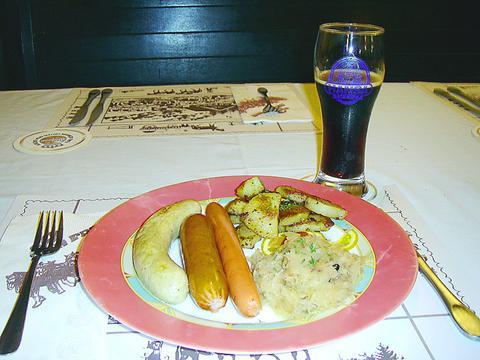Qi Tiao Tong (
Zum Fass (

PHOTO: CHRIS FUCHS, TAIPEI TIMES
But why put a German-Swiss restaurant here? "This building used to have a Swiss air-conditioning company in it," said Jack Hsu (
In the beginning, the beer took priority over the food, Hsu said. Most of the dishes were made by the wives of Swiss businessmen who worked upstairs. It wasn't until a bit later that a Swiss cook was flown over and hired to create standard restaurant fare. Those recipes are the ones that are still used today, Hsu said.
The menu has over 50 selections, with such Swiss and German specialties as gemischte wurst (a variety of German sausages) and schweinshaxe (roasted pig knuckles), which Hsu said is a favorite among his customers.
The gemischte wurst includes three types of sausage: veal, cheese and frankfurter. None of them is overly sweet. A healthy portion of homefries and imported sauerkraut -- which doesn't have that from-the-can-sour taste -- rounds off the meal.
The perennial favorite at Zum Fass, though, is roasted pork knuckle. Hsu said pork knuckle is often fried to make it crispy. Zum Fass, however, roasts its pork knuckle for more than three hours, allowing the skin to gradually turn dark red and the meat tender.
What would German food be without German beer? Zum Fass's draft selection is Warsteiner Vorn Fass. Erdinger (in three different varieties) -- Kristallklar, Dunkel and Hefe -- is also available in the bottle.
Hsu said Zum Fass hasn't changed one iota since it opened in 1977. Consistency, he said, is what has made his restaurant stand out among his neighbors along Qi Tiao Tong.

Most heroes are remembered for the battles they fought. Taiwan’s Black Bat Squadron is remembered for flying into Chinese airspace 838 times between 1953 and 1967, and for the 148 men whose sacrifice bought the intelligence that kept Taiwan secure. Two-thirds of the squadron died carrying out missions most people wouldn’t learn about for another 40 years. The squadron lost 15 aircraft and 148 crew members over those 14 years, making it the deadliest unit in Taiwan’s military history by casualty rate. They flew at night, often at low altitudes, straight into some of the most heavily defended airspace in Asia.

Beijing’s ironic, abusive tantrums aimed at Japan since Japanese Prime Minister Sanae Takaichi publicly stated that a Taiwan contingency would be an existential crisis for Japan, have revealed for all the world to see that the People’s Republic of China (PRC) lusts after Okinawa. We all owe Takaichi a debt of thanks for getting the PRC to make that public. The PRC and its netizens, taking their cue from the Chinese Communist Party (CCP), are presenting Okinawa by mirroring the claims about Taiwan. Official PRC propaganda organs began to wax lyrical about Okinawa’s “unsettled status” beginning last month. A Global

Taiwan’s democracy is at risk. Be very alarmed. This is not a drill. The current constitutional crisis progressed slowly, then suddenly. Political tensions, partisan hostility and emotions are all running high right when cool heads and calm negotiation are most needed. Oxford defines brinkmanship as: “The art or practice of pursuing a dangerous policy to the limits of safety before stopping, especially in politics.” It says the term comes from a quote from a 1956 Cold War interview with then-American Secretary of State John Foster Dulles, when he said: ‘The ability to get to the verge without getting into the war is

Like much in the world today, theater has experienced major disruptions over the six years since COVID-19. The pandemic, the war in Ukraine and social media have created a new normal of geopolitical and information uncertainty, and the performing arts are not immune to these effects. “Ten years ago people wanted to come to the theater to engage with important issues, but now the Internet allows them to engage with those issues powerfully and immediately,” said Faith Tan, programming director of the Esplanade in Singapore, speaking last week in Japan. “One reaction to unpredictability has been a renewed emphasis on